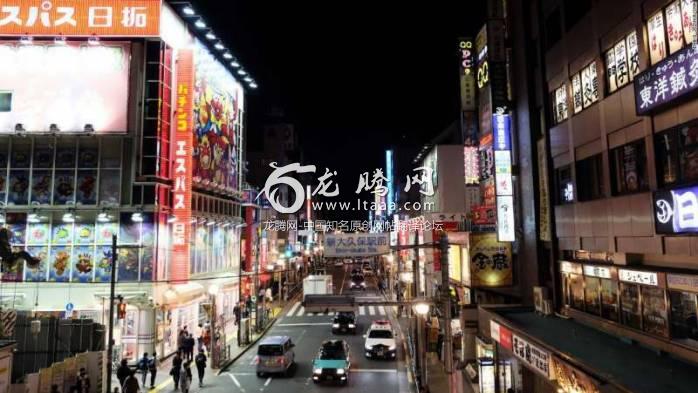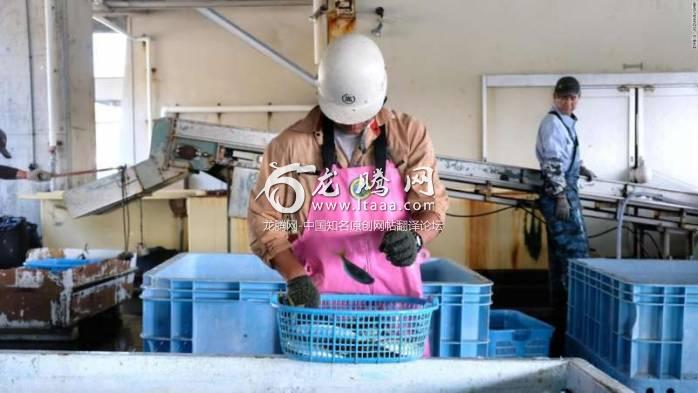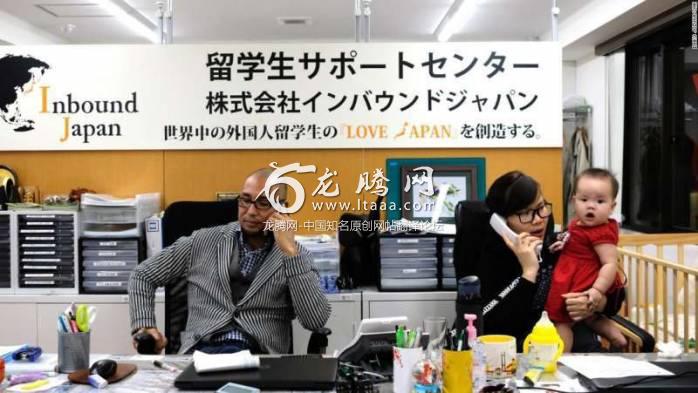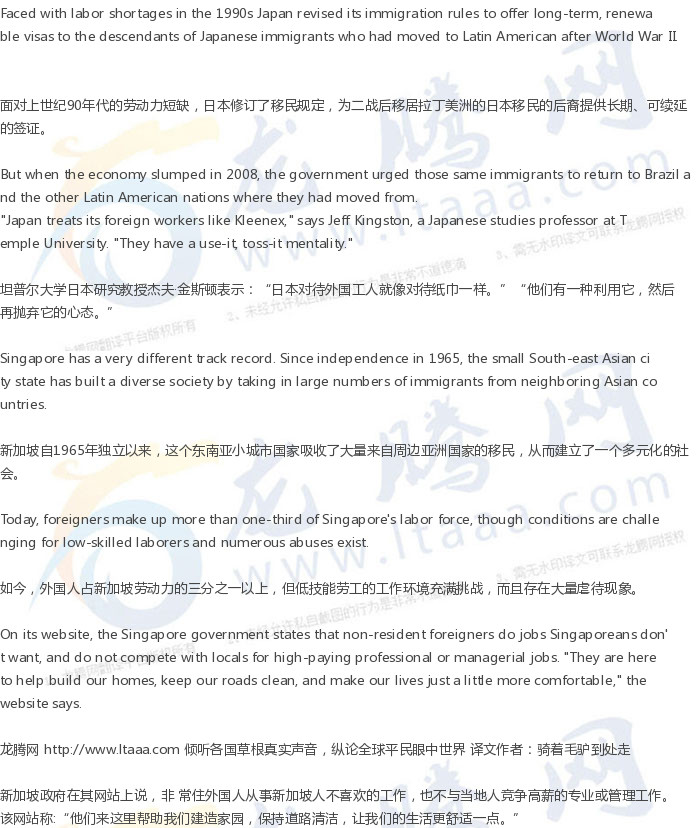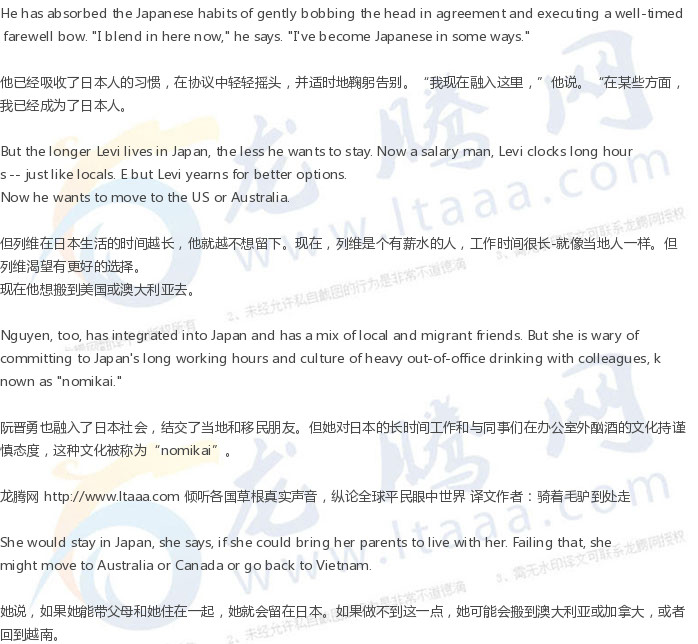日本需要移民,但移民需要日本吗?-CNN [美国媒体]
移民法的一项拟议修正案如果获得通过,将为外国工人创造两类新的签证。第一类可以延长5年,将覆盖半合格的蓝领工人,并旨在填补护理和制造业等领域的空白。
Japan needs immigrants, but do immigrants need Japan? - CNN
日本需要移民,但移民需要日本吗?-CNN
Japan's new immigration law
A proposed amendment to the immigration law, if passed, will create two new visas for foreign workers.
The first, renewable for up to 5 years, would cover semi-qualified, blue-collar workers, and is aimed at plugging gaps in areas such as care-giving and manufacturin
日本新移民法
移民法的一项拟议修正案如果获得通过,将为外国工人创造两类新的签证。
第一类可以延长5年,将覆盖半合格的蓝领工人,并旨在填补护理和制造业等领域的空白
The second type, which would have no renewal limit, is aimed at attracting high-skilled workers. Both visas require proficiency in Japanese.
第二类没有更新限制,目的是吸引高技能工人.这两种签证都需要精通日语。
The decline means a shrinking cohort of workers is left supporting an increasingly elderly population in need of healthcare and pensions.
下降意味着萎缩的工人群体继续维持日益增长的老年人口需要医疗保健和养老金。
But Japan isn't the only country with such a problem.
Germany is a also a "super-aged" nation. And by 2030, the US, UK, Singapore and France are expected to have earned that status. While the EU and US veer towards populism and adopt anti-immigrant stances, in Asia nations are competing for new arrivals, potentially reversing the power balance between immigrants and host countries.
但日本并不是唯一有这种问题的国家。
德国也是一个“超级老龄化”国家。到了2030,美国,英国, 新加坡和法国也可能会出现老龄危机。尽管欧盟和美国转向民粹主义,采取反移民的立场,但在亚洲,各国都在争夺新移民,这有可能扭转移民与收容国之间的权力平衡。
If Abe is to prevent Japan's population from dipping below 100 million by 2060, he will need to provide migrants good reasons to choose the country, says Hisakazu Kato, an economics professor at Meiji University in Tokyo.
如果安倍想阻止日本人口下降到到2060年的1亿,东京明治大学经济学教授加藤久表示,他需要为移民提供选择日本这一国家的充分理由。
As immigration policy has failed to keep up with demand, temporary fixes have plugged the gap. Foreigners on student visas, for example, can work up to 28 hours per week -- but Japan has been accused of using students to fill labor shortages.
由于移民政策未能跟上需求,日本出台临时措施填补了缺口。例如,持学生签证的外国人每周最多可以工作28小时,但这也致使日本被指利用学生填补劳动力短缺。
While Japan might be coming around to the appeal of foreigner workers, not all of the newcomers are keen on Japanese work culture.
虽然日本可能正在迎合外国工人的吸引力,但并非所有新来者都热衷于日本的工作文化。
Samir Levi came to Japan from Nepal four years ago, after his older brother did a six-week cultural exchange in Tokyo. Levi, 26, worked a part-time job as a dishwasher in a ramen shop and the graveyard shift at a convenience store, before becoming a recruiter for a Japanese language school in the capital.
萨米尔·列维四年前从尼泊尔来到日本,他的哥哥在东京进行了为期六周的文化交流。26岁的列维在一家拉面店做过洗碗工,在一家便利店当过晚班,后来成为东京一所日语学校的招聘人员。
"I haven't lost my fascination with Japan yet," Nyugen says. "But perhaps Japan may need to realize that it needs foreigners as opposed to the other way around."
“我还没有失去对日本的迷恋,”阮晋勇说。“但或许日本需要认识到,它需要的是外国人,而不是相反的情况。”
版权声明
我们致力于传递世界各地老百姓最真实、最直接、最详尽的对中国的看法
【版权与免责声明】如发现内容存在版权问题,烦请提供相关信息发邮件,
我们将及时沟通与处理。本站内容除非来源注明五毛网,否则均为网友转载,涉及言论、版权与本站无关。
本文仅代表作者观点,不代表本站立场。
本文来自网络,如有侵权及时联系本网站。
下一篇: 中国商用电动车独占全球市场 [美国媒体]
图文文章RECOMMEND
热门文章HOT NEWS
-
1
Why do most people who have a positive view of China have been to ...
- 2
- 3
- 4
- 5
- 6
- 7
- 8
- 9
- 10
推荐文章HOT NEWS
-
1
Why do most people who have a positive view of China have been to ...
- 2
- 3
- 4
- 5
- 6
- 7
- 8
- 9
- 10
